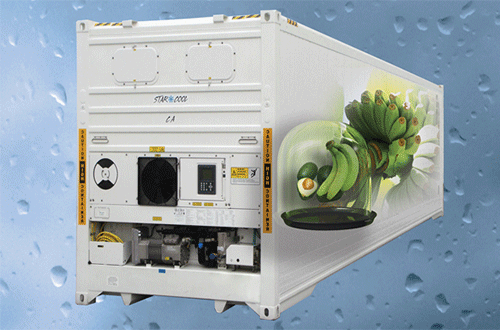Maersk พัฒนาตู้คอนเทนเนอร์ชนิดพิเศษ เพื่อรักษาคุณภาพสินค้าทางการเกษตร
POSTED ON 09/09/2557

ข่าวโลจิสติกส์ - "แมทธิว เฉด" ผู้จัดการฝ่ายตู้คอนเทนเนอร์ บริษัท Africa Express Line (AEL) ซึ่งเป็นผู้เชี่ยวชาญด้านการขนส่งสินค้า กล่าวว่า "ระยะเวลา 4-6 สัปดาห์ในเดือนเมษายนถึงพฤษภาคม มะม่วงคุณภาพดีจะผลิดอกออกผลทั่วประเทศ แต่พอฤดูฝนมาทุกอย่างก็จบ จากนั้นมะม่วงก็จะเริ่มเน่าเสีย โดยเมื่อเดือนเมษายนที่ผ่านมา Eolis ซึ่งเป็นบริษัทโลจิสติกส์ได้ติดต่อเรามา พวกเขาต้องการสมาร์ทโซลูชั่นที่จะช่วยรักษารสชาติของผลไม้และทำให้วางจำหน่ายได้ยาวนานขึ้น"
โซลูชั่นที่จะตอบโจทย์นี้ได้ก็คือ "Star Cool CA" ตู้คอนเทนเนอร์แช่เย็นแบบพิเศษ ด้วยความช่วยเหลืออย่างรวดเร็วจากบริษัทผู้ให้เช่าตู้คอนเทนเนอร์และคลังเก็บตู้คอนเทนเนอร์ในเมืองแอนต์เวิร์ป ประเทศเบลเยียม ตู้คอนเทนเนอร์ Star Cool จึงได้รับการปรับปรุงเพื่อใช้เก็บรักษาสินค้าด้วยวิธีควบคุมบรรยากาศ หรือที่เรียกว่า CA และส่งไปยังไอวอรีโคสต์
ตู้คอนเทนเนอร์แช่เย็น Star Cool CA สามารถปรับระดับออกซิเจน (O2) และคาร์บอนไดออกไซด์ (CO2) ได้ ช่วยให้สามารถควบคุมอัตราการหายใจและความสุกของผลไม้ได้อย่างมีประสิทธิภาพ
"เราทราบดีว่า Star Cool CA สามารถยืดระยะเวลาการเก็บรักษากล้วย และอะโวคาโดได้ ส่วนมะม่วงก็มีอัตราการหายใจในระดับเดียวกัน ดังนั้นจึงไม่น่าแปลกใจที่การทดลองกับมะม่วงประสบผลสำเร็จเป็นอย่างดี" แมทธิว เฉด กล่าว "ผมคิดว่านี่เป็นโอกาสใหม่ทางธุรกิจสำหรับเกษตรกรที่ไม่สามารถส่งผลไม้จำนวนมากไปสู่ตลาดได้ทันเวลา"
ด้าน แอนเดอร์ส จี โฮล์ม จากบริษัท Maersk Container Industry ผู้ผลิตตู้คอนเทนเนอร์แช่เย็น Star Cool CA กล่าวว่า "เมื่อผสานความสามารถในกระบวนการโลจิสติกส์เข้าไว้ด้วยกัน ก็จะสามารถถนอมอาหารและเปิดโอกาสทางธุรกิจได้ ผมกล้าพูดได้ว่านี่อาจเป็นการปฏิวัติวงการมะม่วงเลยก็ว่าได้"
การทดสอบตู้คอนเทนเนอร์แช่เย็นประสบความสำเร็จ : เมื่อเดือนพฤษภาคม 2557 มะม่วงถูกบรรจุในตู้คอนเทนเนอร์ Star Cool CA จำนวน 5 ตู้ จากนั้นถูกเปิดออกทีละตู้ในช่วงเวลา 4-9 สัปดาห์ และทุกครั้งมะม่วงยังคงอยู่ในสภาพเดิมเหมือนตอนที่เพิ่งบรรจุใหม่ๆ (แหล่งข้อมูล : Africa Express Line)
มะม่วงทั่วโลกมีการส่งออกเพียงแค่ 3% เท่านั้น : ผลผลิตมะม่วงทั่วโลกเพิ่มขึ้นสองเท่าในช่วง 30 ปีที่ผ่านมา จนมีมากกว่า 35 ล้านตัน ทว่าในจำนวนนี้มีเพียง 3% เท่านั้นที่ถูกส่งออกไปยังต่างประเทศ เนื่องจากมะม่วงเป็นผลไม้ช้ำง่าย ซึ่งถือเป็นเหตุผลสำคัญที่ทำให้มะม่วงส่วนใหญ่มีการบริโภคกันใกล้กับแหล่งผลิต (แหล่งข่าว : UNCTAD)
หลีกเลี่ยงค่าขนส่งทางอากาศที่มีราคาแพงได้ : สัดส่วนของมะม่วงที่ส่งออกจากแอฟริกาตะวันตกผ่านทางเครื่องบินมีปริมาณค่อนข้างมาก เพราะหลายประเทศ เช่น เซเนกัล หรือ ไอวอรีโคสต์ ต่างประสบกับปัญหาการขนส่งมะม่วงทางทะเล
Logistic News - "For a 4-6 week period in April and May, the country is flooded with good mangos, but it ends abruptly when the rainy season starts. From then on, the mango just starts decaying," explains Mathew Shed, container manager in the specialist shipping company Africa Express Line (AEL).
"We were approached in April by Eolis, a CF logistics company, who asked for some kind of smart solution that would keep the fruit delicious and marketable for a longer time," he adds.
The solution turned out to be special reefer containers. With quick help from a container leasing company and a container depot in Antwerp, Belgium, Star Cool containers were upgraded to work with controlled atmosphere, in short known as CA, and sent to Ivory Coast.
Star Cool CA reefers adjust O2 and CO2 levels, which in turn keep the fruit's respiration and ripening under control.
"We knew how Star Cool CA extends the storage life of bananas and avocados. Mangos have similar respiration rates so the success of the mango test is really not a big surprise," says Mathew Shed.
"I think there is a new business opportunity for farmers whose excess fruit never makes it to the market in time," Mathew Shed says.
Anders G. Holm from Maersk Container Industry, the maker of Star Cool CA, is delighted.
"Combined competences along the logistics chain can save food and open up business," says Holm. "I'll even go so far as to say this could become a mango revolution."
Why the reefer test was a success : Five Star Cool CA containers were loaded in May 2014 and then opened one by one over a period of four to nine weeks. Each time, the fruit generally turned out to be in the same condition as when it was loaded. (Source: Africa Express Line.)
Only 3 percent of world mango production is exported : Global production of mangos has doubled in the last 30 years to more than 35 million tonnes, but only about 3 percent is traded internationally. Fragility is one reason why most mangos are still consumed close to the place of production. (Source: UNCTAD)
Costly air transport can be avoided : The proportion of mangos exported from West Africa by air is relatively high. Impediments to ocean transport may be restricting the full mango export potential of countries like Senegal or Ivory Coast.

